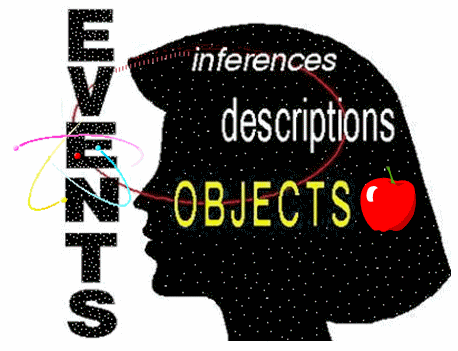Descriptions
and
Inferences
Written 1996 by Steven Lewis
The methods of science involve a natural order of evaluation: events before objects, objects before descriptions, descriptions before inferences. By differentiating inferences from descriptions, as well as different orders of descriptions and inferences, we are forced to recall that what we know is not all and not "it," but an abstraction from "it."
Descriptions are closer to the first order facts than inferences. For example, you leave the mall but can't find your car. You report to mall security, "I can't find my car." We would label this a description. We merely reported the known data without adding data that were not abstracted. On the other hand, if we report "My car was stolen" then we would call this an inference, for it goes beyond that fact that we can't find our car and adds data that were not abstracted.
Suppose you reported "Those worthless illegal immigrants stole my car -- the greatest car in the world." Because of the added data and affect not abstracted from the events, we could say that this inference is of a higher order (more detached from the actual facts) than the previous one. As we move to higher levels of inferences in our daily abstractions we trek on less firm ground. But one who is conscious of abstracting can do this without the negative consequences of ones who are not, because those who are conscious of abstracting will treat their inferences as inferences and not the first-order facts, so will be less likely to act on them hastily and more likely to look for additional data to test the inferences. These people do not appear often on American talk shows, however.
Although descriptions are closer to the primary facts than inferences, descriptions can vary from one person to another; after all, they are not the primary facts either. How we describe a common event depends on our observational skills, level of alertness, language skills, previous experiences .... This was impressed on me several years ago when four of us were standing side-by-side at an intersection when a two-car accident happened right in front of us. After the accident we compared notes as to what we saw and each of us described the accident in ways contradictory to the others' descriptions. One person even differed from the rest of the group in terms of who hit whom.
The moral of the story is that our descriptions and inferences are never going to be identical (the same in all details), but we can avoid many of the potential negative consequences of our higher order abstracting through consciousness of abstracting. When we evaluate event first, object next, description first, inference next -- we keep our feet planted more securely in the unlimited extensional facts, preventing superficiality and promoting curiosity.
Go to General Semantics Home Page ||| Go to Steven Lewis Home Page
